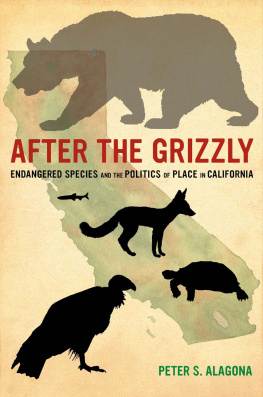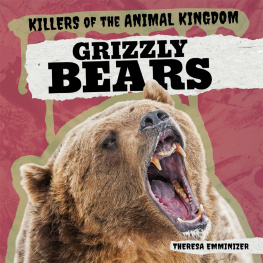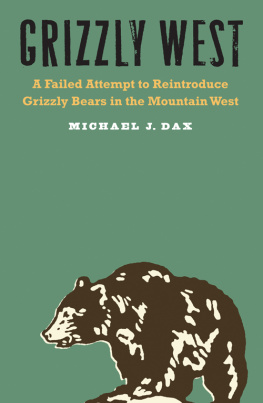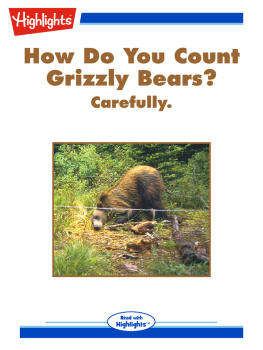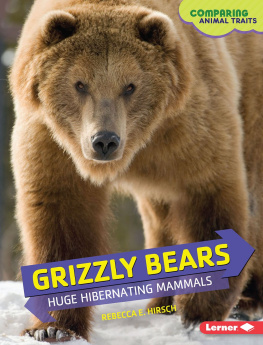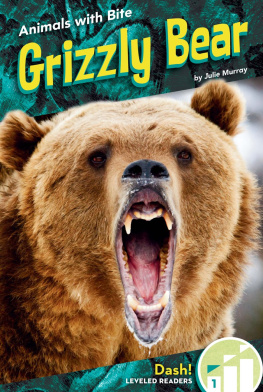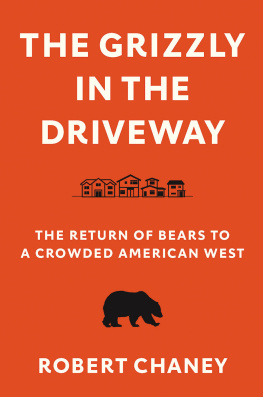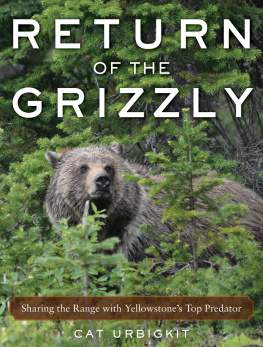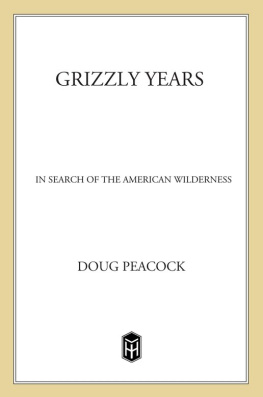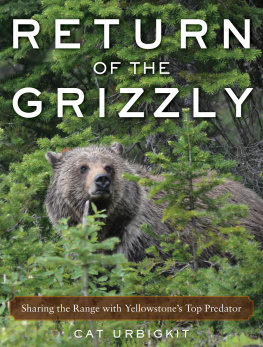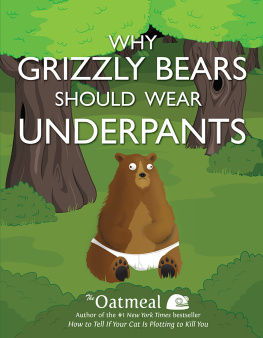Alagona - After the Grizzly
Here you can read online Alagona - After the Grizzly full text of the book (entire story) in english for free. Download pdf and epub, get meaning, cover and reviews about this ebook. publisher: University of California Press, genre: Politics. Description of the work, (preface) as well as reviews are available. Best literature library LitArk.com created for fans of good reading and offers a wide selection of genres:
Romance novel
Science fiction
Adventure
Detective
Science
History
Home and family
Prose
Art
Politics
Computer
Non-fiction
Religion
Business
Children
Humor
Choose a favorite category and find really read worthwhile books. Enjoy immersion in the world of imagination, feel the emotions of the characters or learn something new for yourself, make an fascinating discovery.
After the Grizzly: summary, description and annotation
We offer to read an annotation, description, summary or preface (depends on what the author of the book "After the Grizzly" wrote himself). If you haven't found the necessary information about the book — write in the comments, we will try to find it.
After the Grizzly — read online for free the complete book (whole text) full work
Below is the text of the book, divided by pages. System saving the place of the last page read, allows you to conveniently read the book "After the Grizzly" online for free, without having to search again every time where you left off. Put a bookmark, and you can go to the page where you finished reading at any time.
Font size:
Interval:
Bookmark:

AFTER THE GRIZZLY
The publisher gratefully acknowledges the generous support of the Gordon and Betty Moore Fund in Environmental Studies of the University of California Press Foundation.
The publisher also gratefully acknowledges the generous support of the Humanities Endowment Fund of the University of California Press Foundation.
Peter S. Alagona | AFTER THE GRIZZLY |
Endangered Species and the Politics of Place in California |

University of California Press
BerkeleyLos AngelesLondon
University of California Press, one of the most distinguished university presses in the United States, enriches lives around the world by advancing scholarship in the humanities, social sciences, and natural sciences. Its activities are supported by the UC Press Foundation and by philanthropic contributions from individuals and institutions. For more information, visit www.ucpress.edu.
University of California Press
Berkeley and Los Angeles, California
University of California Press, Ltd.
London, England
2013 by The Regents of the University of California
Library of Congress Cataloging-in-Publication Data
Alagona, Peter S.
After the grizzly : endangered species and the politics of place in California / Peter S. Alagona.
pagescm
Includes bibliographical references and index.
ISBN 978-0-520-27506-5 (cloth : alk. paper)
eISBN 9780520954410
1. Wildlife conservationCalifornia.2. Wildlife conservationUnited States.3. Endangered speciesCalifornia.4. Endangered speciesUnited States.5. Grizzly bearCalifornia.I. Title.
QL 82. A 422013
591.68dc23
2012038183
Manufactured in the United States of America
22 21 20 19 18 17 16 15 14 13
10 9 8 7 6 5 4 3 2 1
In keeping with a commitment to support environmentally responsible and sustainable printing practices, UC Press has printed this book on Rolland Enviro100, a 100% post-consumer fiber paper that is FSC certified, deinked, processed chlorine-free, and manufactured with renewable biogas energy. It is acid-free and EcoLogo certified.
CONTENTS
ACKNOWLEDGMENTS
This book was a long time in coming. Depending on how you count, it took half a decade, a decade, or a decade and a half to complete. I dont like to do the math. All I know is that without the support and encouragement of my family, friends, colleagues, mentors, and students, I never would have finished this project.
During my career, I have had the good fortune to work with an outstanding collection of mentors. At Northwestern Peter Hayes inspired me, challenged me, and invited me to consider history as a career. At UC Santa Barbara Frank Davis encouraged my interest in ecology and conservation. At UCLA my doctoral committee membersJessica Wang, Stephen Aron, Ted Porter, and Rick Vanceeach brought distinct and indispensible perspectives. I am especially indebted to Jessica for her sage advice and commitment to my cause. At Harvard I had the formative experience of working with Sheila Jasanoff, and at Stanford I benefitted immeasurably from my time with Richard White, who read a full draft of the manuscript and provided vital feedback.
It is a delight to thank my many friends and colleagues who contributed to this project with their insight, advice, and encouragement: Gregory Simon, Lissa Wadewitz, Lawrence Culver, Emily Scott, Jay Turner, Mark Barrow, Etienne Benson, Jeremy Vetter, Robert Wilson, Jenny Price, Roxanne Willis, Stefan Sperling, Matt Booker, Jon Christensen, Fritz Davis, Phil Garone, Anita Guerrini, Andrew Mathews, Patrick McCray, Gabriela Soto Laveaga, Simone Pulver, Stephanie Pincetl, David Igler, Erica Fleischman, Chris Pyke, Britta Bierwagen, Noah Goldstein, Heather Rosenberg, Holly Doremus, Stephen Bocking, Paul Sutter, Nathan Sayre, Stephanie Pincetl, Carla DAntonio, Stve Barnardin, and Jacquelyn Langberg among others. I also thank John Majewski and Josh Schimel, who served as the chairs of the History Department and Environmental Studies Program during my first few years as a faculty member at UCSB, for their extraordinary confidence and support.
I received help with my research from a number of scientists, agency officials, archivists, librarians, and editors. I am particularly indebted to Jan Hamber, Susan Snyder, Brian Cypher, Pete Woodman, Kristin Berry, James Moore, Cameron Barrows, Travis Longcore, John Mattox, Lloyd Kiff, Peter Sorensen, and Peggy Woodeach of whom spent valuable time with meas well as the staffs of the California Academy of Sciences, Oregon State University Archives, California State Archives, Natural History Museum of Los Angeles County, Santa Barbara Museum of Natural History, Yosemite and Joshua Tree national parks, California Department of Fish and Game, U.S. Fish and Wildlife Service, and the Museum of Vertebrate Zoology and Bancroft and Bioscience libraries at the University of California, Berkeley. I also thank Cathryn Carson and her colleagues from the Office for the History of Science and Technology at UC Berkeley for welcoming me as a visiting scholar for two years of research and writing. A special thanks goes out to the three reviewers who read and commented on my draft manuscript. Kate Marshall, from the University of California Press, did a wonderful job producing the book, as did the superb editors I worked with at various stages of the writing process: Jenny Wapner, Blake Edgar, Dore Brown, Juliana Froggatt, and Audra Wolfe.
During the course of this project, I received generous support from the UCLA Graduate Division, The John Randolph Haynes and Dora Haynes Foundation, the Harvard University Center for the Environment, the Bill Lane Center for the American West at Stanford University, and the UCSB College of Letters and Science.
It is a great joy to thank my unwavering, irrepressible parents, Judy and Peter, and my sister, Robyn, who inherited the best of them both. And then there is my own growing family: first Bodie, then Ziti, and now Saula little person with a big personality who changed my life in an instant almost a year ago and has done it again every day since. I dedicate this book to Jessica who saw it, and me, through from beginning to end. Like everything else in our lives together, this too was a team effort.
INTRODUCTION
One hot morning in the spring of 2004, I found myself in a distant corner of the Mojave Desert, standing in a field surrounded by saltbush and sage, feeling disoriented, overdressed, and a little embarrassed. A biologist named Peggy Wood had agreed to let me tag along with her while she tracked a small population of desert tortoises in a fenced area to which they had been moved to make way for the construction of an automobile test track. Peggy had handed me a radio telemetry receiver and an antenna and explained how to use the two devices to locate the tortoises she and her colleagues had fitted with beacons as part of the projects wildlife translocation and mitigation effort. I set off on foot to search for a signal, and within a few minutes, sure enough, the receivers faint, intermittent chirps merged into a loud, continuous buzz. According to the receiver, I was standing practically on top of a fifteen-inch-long adult desert tortoise with a plastic and metal radio glued to its back. I had heard that desert tortoises were masters of disguise, but this was absurd. Here I was, just feet from the Mojaves most famous endangered species, and I couldnt find it. All I could see in front of me, when I turned away from the graders and bulldozers next door, was miles and miles of desert.
Font size:
Interval:
Bookmark:
Similar books «After the Grizzly»
Look at similar books to After the Grizzly. We have selected literature similar in name and meaning in the hope of providing readers with more options to find new, interesting, not yet read works.
Discussion, reviews of the book After the Grizzly and just readers' own opinions. Leave your comments, write what you think about the work, its meaning or the main characters. Specify what exactly you liked and what you didn't like, and why you think so.

